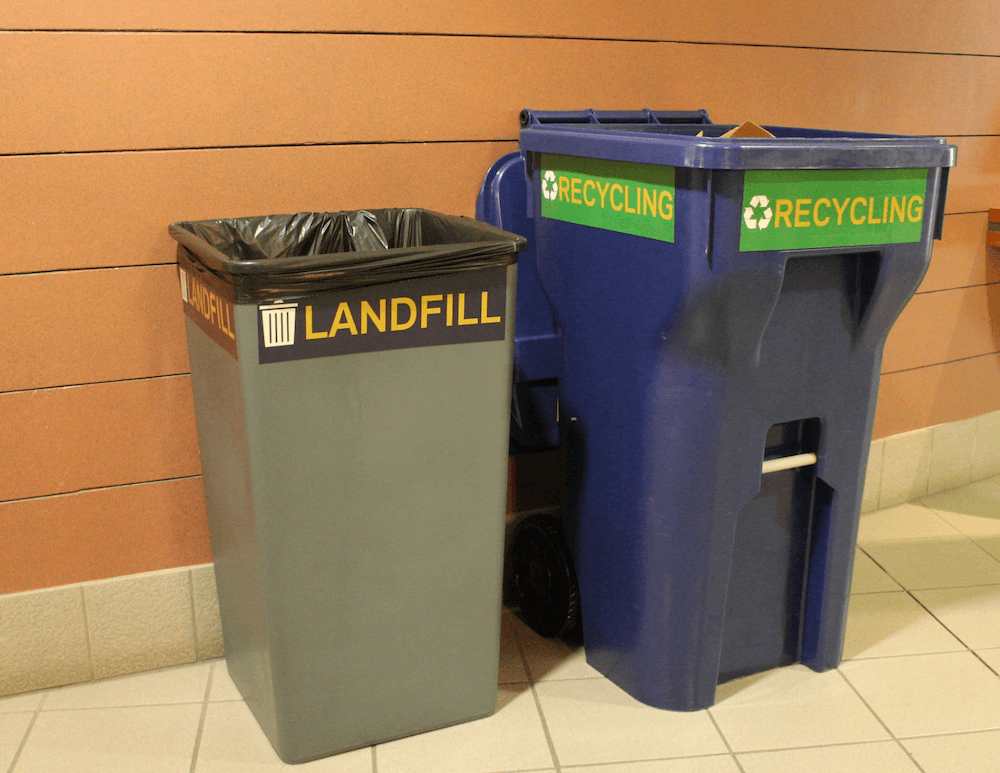Recycling on Campus
Our University’s mission and Catholic values remind us that reducing waste is an essential part of caring for our common home. The success of the expanding campus recycling program relies on each of us, as we all play a significant role in shaping a cleaner, more sustainable future.
Significant changes in the recycling industry have challenged waste diversion efforts worldwide, demanding the University adapt its campus recycling services. Waste management services like recycling are complex, and require collaboration and dedication from multiple departments to ensure success. At Notre Dame, Building Services and Sustainability have partnered to respond to recycling changes and rebuild the program to accommodate today’s market.

The Current State of Recycling
Single-stream recycling has returned to the campus on a broader scale once again. To make the process more effective and ensure that our recyclables are being properly recycled, we need to refocus our efforts on collecting clean and contaminant-free recyclables. The Building Services and Recycling Services team members, along with the Sustainability team have been working to reintroduce single-stream recycling across campus via the centralized toter system, which works just like your municipal recycling pick-up system at home. During the 2023-2024 academic year, recycling is expanding across campus to become more accessible in residence halls with piloted updates in academic spaces. Current changes are as follows:
- Most residence halls now have recycling available on every floor. Some halls may only have recycling on the first floor or basement if an elevator is not present, or the addition of a recycling toter would make the space difficult to navigate. Students are still responsible for emptying unbagged recyclables from their personal bins into the centrally located toters within the residence halls. This recycling postcard provides additional information about recycling in residence halls and answers frequently asked questions.
- Throughout the academic year, old common area recycling collection bins are going away in academic and office spaces. This process began in 2022 and continues today. Removal includes bins that are currently located in copy rooms, hallways, classrooms, labs, kitchens, etc. The only centralized recycling stations available will be where a recycling toter is situated. See the list of locations to find a toter nearest you. Personal desk-side recycling bins will still be available. Occupants are encouraged to empty their personal bins into centralized waste collection toters between scheduled service intervals. If you have mobility limitations and require assistance emptying your personal bin, please contact your building manager for accommodations. Overall, this change helps to reduce material contamination, ensures consistency for recycling across campus, and reflects best practices in waste diversion practices. As we learn and adapt from these piloted spaces, more academic units will be updated to reflect similar changes. Currently, the following academic spaces have been updated:
-
- Bond Hall, as of November 2023
- Coleman-Morse, as of September 2023
- Corbett Hall, as of November 2023
- DeBartolo Hall, as of August 2023
- Fire Station, as of March 2024
- Hammes Mowbray, as of April 2024
- Hesburgh Library (first floor), as of November 2023
- Jordan Hall of Science, as of October 2023
- Landscape Services, as of April 2024
- Mail Distribution Center, as of February 2024
- Main Building, as of November 2023
- Mason Services Center, as of February 2024
- Mendoza Hall, as of January 2024
- O'Shaughnessy Hall, as of August 2023
- Stayer Center, as of January 2024
- Walsh Family Architecture Hall, as of January 2024
The current aesthetic of open-air toters is not the final decision. Implementing toters across campus is only the first step in this process. As we continue to identify the various spatial needs of the campus, further decisions will be made about how to better blend toters into the aesthetics of our beautiful campus and its unique collection of buildings.
Previous Recycling Changes on Campus
In 2007, Notre Dame switched to single-stream recycling on campus, allowing clean recyclables to be collected in the same recycling container. Blue centralized bins were located throughout common campus spaces to increase collection efforts and bagged by custodial staff.
Faced with significant fluctuations in the worldwide recycling markets, along with the challenges of the COVID-19 pandemic, campus recycling in non-residence halls was temporarily paused during 2020. The University continued its efforts of collecting clean cans, bottles, paper, and cardboard for recycling in the residence halls. Additional efforts were made to expand recycling into other buildings on campus.
Additional Recycling Resources
Submit feedback about the current recycling expansion changes
Learn what can be recycled on campus through the single-stream recycling program